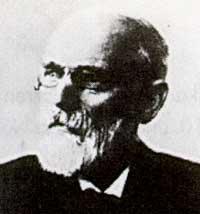Van Der Waals, Johannes Diderik
(1837-1923)
Dutch physicist born in Leiden in 1837. As a young man he was a refined student and a hard-working researcher, and in 1862 he knew the theories of most physicists of his time to attend the University of Leiden.
He presented a thesis on the nature of gases and the liquefaction process. The clarity of the exhibition immediately aroused the curiosity of scientists and in 1877 offered him the position of professor of physics at the University of Amsterdam. There he completed all his studies and worked as a teacher until his retirement.

Van der Waals intended to renew the theories of Boyle and Charles. Boyle had already defined the relationship between pressure and volume and Charles defined the relationship between temperature and volume. However, he considered that these laws were not always fulfilled in reality and that they could only be considered as real laws in the case of ideal gases. In the following years he studied the differences between ideal gases and conventional gases, and for this he relied on the kinetic theory of Maxwell and Boltzmann, who in 1873 renewed the equation of gases, defining the two new variables to consider in each particular case. On the one hand, he pointed out that it is necessary to take into account the characteristics of the molecules of each gas and, on the other, that the interactions between them did not have to be the same. The new equation is named after Van der Waals in honor of its discoverer.
In 1910 he won the Nobel Prize in Physics for his essays to analyze the forces of molecular input.
The Van der Waals equation served to correct other postulates until then accepted. Since the Joule-Thomson effect it had been recognized that when the gas expands its low temperature, but said that this is not the same in all cases. He said that this effect only occurs below a characteristic temperature of each gas and focused on studying the cases of helium and hydrogen. It is often said that these ideas accelerated the search for absolute zero and to a large extent it is usually related between the contributions of Van der Waals.
Van der Waals spent his years as the most prosperous researcher in Amsterdam. Death discovered her in 1923 when she went to look for her.
Buletina
Bidali zure helbide elektronikoa eta jaso asteroko buletina zure sarrera-ontzian








